
Beirut: Banks in Lebanon could be flouting laws — or at least the spirit of it — by restricting the weekly amount a citizen can debit from his account. And account holders are well within their rights to pursue claims against such banks, legal sources say. “A big part of what banks have been doing are based on unauthorised and unilateral decisions,” said Zeina Mouanness, a lawyer. “They cannot apply such precautionary measures without clear regulations.” Last month, the Lebanese Central Bank set a limit of $1,000 as weekly withdrawals of cash and another limit on online transfers. ATMs have stopped dispensing US dollars even before the popular protests erupted in the country on October 17. Banks have been applying random caps on weekly cash withdrawals, varying between $100 to $500.
Reclaim their rights So, what can the ordinary Lebanese citizen do? They could look at any of three options. “They could launch a bankruptcy lawsuit against the banks for failing to pay them the amounts requested,” said Mouanness. “They could lodge a breach of trust [criminal case] against the bank. “The third type of legal procedure is lodging a lawsuit before a judge on an urgent basis demanding the bank pay their money in cash. As per the first two procedures, a claimant could also request the court to impose a provisional seizure against the bank’s assets to ensure that the claimants’ money remains safe and untouched.” According to Joceline Al-Rai, another Lebanese lawyer, people also need to read the contracts with their banks. “Clients and depositors have the right to take legal action against their banks and reclaim their money … however, they need to review the clauses included in the contracts they signed upon opening their accounts. Unfortunately, the majority of clients sign those contracts blindly and without reading those clauses thoroughly,” Al-Rai told Gulf News.
The laws of the land allow citizen to take such action. In case of a criminal lawsuit — as with a breach of trust — it is up to the pertinent court to estimate the deserved civil compensation against damages accrued by the claimant. According to article 670 of the Lebanese Penal Code, a suspect — be it a business or an individual — who withholds, disperses, embezzles or misappropriates a victim’s deposit faces imprisonment of between two months to two years and a minimum fine of 50,000 Lebanese pounds.
In agreement
Even those in the banking industry reckon that laws have been breached. “For banks to apply such precautionary measures, it should be done lawfully,” said a banker who wished to speak in anonymity. “We don’t have any law that permits banks to limit cash withdrawals or deny clients from accessing their deposits. “Members of Parliament must legislate a law to allow banks to apply such measures.”
Desperate times
It is easy to blame banks for such drastic measures, but they are trying to make good out of a fast deteriorating situation. Political uncertainty has sparked a long simmering economic crisis, which in turn has forced a liquidity crunch across the economy. Khaled, a branch manager at a bank in the commercial hub of Hamra, said: “Let us not forget that there has been an estimated record withdrawal of $3 billion from banks within the last six months. Such an amount wasn’t even withdrawn during the past three years. “So, banks decided their own measures, despite their acknowledgement that it is illegal … and immoral. Since there is no law that regulates or prohibits such precautionary measures, banks have been applying their procedures, independently, instead of closing counters or leaving clients high and dry.” Many banks are not issuing cheques in Lebanese pounds “but can do transfers into accounts”. “We aren’t supplying the market with Lebanese pounds, except for necessary cases, so that money exchange houses don’t abuse that cash given to people,” another banker said. “Individuals need US dollars because they’ve more confidence in that currency. However, clients could still use their debit/credit cards.”
A judge steps in
Last week, a judge ordered Bank Byblos to release a depositor’s funds in full, making it the first ruling of its kind since Lebanese banks started implementing informal capital controls. Judge Ahmad Mezher ordered the release of 129,000 euros that a company had deposited in a current account. The depositor initiated legal action against the bank that had refused her withdrawal rights and citing the country’s precarious financial condition. In his ruling, the judge deemed the bank’s procedures as “illegal” and ordered the bank to pay a daily fine of around $13,500 in case of failing to release the deposit.



